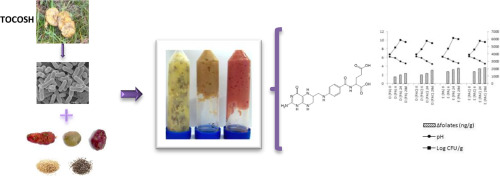Food Research International ( IF 8.1 ) Pub Date : 2018-04-04 , DOI: 10.1016/j.foodres.2018.03.073 A.L. Mosso , M.E. Jimenez , G. Vignolo , J.G. LeBlanc , N.C. Samman

|
It is known that certain lactic acid bacterial (LAB) strains can produce folates, a B-group vitamin that cannot be synthesized by humans and must be exogenously obtained. The aim of this study was to select folate-producing LAB and evaluate their probiotic characteristics in order to obtain a tuber-based food with elevated folate content. Several LAB strains were isolated from a traditional Andean fermented potato product tocosh and cultured in folate-free culture medium. Five folate-producing strains (29–138 ng/mL) were selected to ferment three Andean tubers (potato S. tuberosum spp. andigena, oca Oxalis tuberosa and papalisa Ullucus tuberosus). Sterile purees were inoculated and samples were collected at 0, 6 and 24 h of fermentation and after 28 days of cold storage. Cell growth, pH and total folate were determined. All selected strains were able to grow and produce folates in the substrates and two Lactobacillus sakei strains, CRL 2209 and CRL 2210, produced the highest folate concentrations (730–1484 ng/g after 24 h fermentation). These strains were selected to ferment potato substrates supplemented with amaranth (Amaranthus caudathus) and chia (Salvia hispanica) flour to increase the nutritional value. This addition increased folate synthesis in 89–95%. Furthermore, the ability to survive under simulated gastrointestinal conditions was evaluated and cell counts of the 5 strains remained above the recommended for a probiotic candidate (8.0 log CFU/mL). In conclusion, the selected LAB could be considered potentially probiotic strains and could be used to produce novel tuber based products with elevated folate concentrations. These products could also be used as novel food matrixes for the delivery of probiotic microorganisms.
中文翻译:

使用潜在的益生菌乳酸菌增加块茎食品的叶酸含量
已知某些乳酸菌(LAB)菌株可以产生叶酸,叶酸是人类无法合成的B类维生素,必须从外源获得。这项研究的目的是选择产生叶酸的LAB并评估其益生菌特性,从而获得具有较高叶酸含量的块茎类食品。从传统的Andean发酵马铃薯产品tocosh中分离出几种LAB菌株,并在无叶酸的培养基中进行培养。五叶酸生产菌(29-138毫微克/毫升)被选定发酵3个斯块茎(马铃薯马铃薯属andigena,酢酢浆荸荠和papalisa Ullucus菊芋)。接种无菌果泥,并在发酵的0、6和24小时以及冷藏28天后收集样品。测定细胞生长,pH和总叶酸。所有选定的菌株都能够在底物中生长并产生叶酸,而两个乳酸杆菌菌株CRL 2209和CRL 2210产生的叶酸浓度最高(发酵24小时后的叶酸浓度为730-1484 ng / g)。选择这些菌株发酵补充a菜(Amaranthus caudathus)和奇亚(Salvia hispanica)的马铃薯基质。)面粉增加营养价值。这种添加使叶酸的合成增加了89–95%。此外,评估了在模拟胃肠道条件下的生存能力,并且这5个菌株的细胞计数仍高于推荐的益生菌候选药物(8.0 log CFU / mL)。总之,所选的LAB可被视为潜在的益生菌菌株,可用于生产叶酸浓度较高的新型块茎产品。这些产品也可以用作新型食品基质,以输送益生菌微生物。


























 京公网安备 11010802027423号
京公网安备 11010802027423号